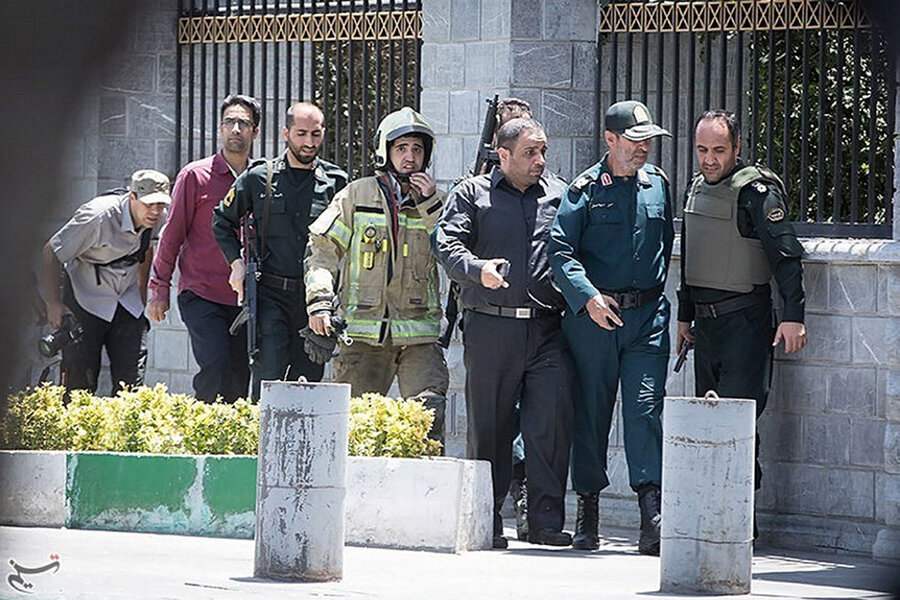Terror in Tehran: Could attacks change Iran's ISIS strategy?
Loading...
| Istanbul
Gunmen and suicide bombers attacked two of the most significant symbols of the Islamic Republic of Iran Wednesday, killing 12 people in Tehran as they raided the parliament building and the mausoleum of Ayatollah Ruhollah Khomeini, the leader of Iran’s 1979 revolution.
The so-called Islamic State (ISIS) claimed responsibility, even as the hours-long battle in parliament was still under way. ISIS broadcast video of one casualty on the floor as gunmen fired and shouted in Arabic, “Do you think we will leave? We will remain, God willing!”
Despite its critical role bolstering local forces to fight ISIS in Iraq and Syria, Iran has been virtually immune to the insecurity and ISIS attacks that have plagued the region, from Libya to Afghanistan.
But the shocking nature of the attacks – the first of their kind in the Islamic Republic for years – raises the question of whether and how they will affect Iran’s threat perception and anti-terror calculations.
Much will depend on how Iran perceives who is responsible, with many Iranians connecting these attacks to recent anti-Iran statements from regional rival Saudi Arabia, which they deem to be a primary backer of ISIS.
Yet questions are being raised, too, about how these two sets of attackers managed to evade Iran’s attentive counter-espionage apparatus and tight internal security. The four gunmen who raided parliament were reportedly disguised as women. One of the two suicide attackers at the Khomeini shrine, one of whom succeeded in detonating a bomb, reportedly was a woman.
Rally around the flag
Security officials said a third “team” was captured prior to Wednesday’s attack.
Analysts say one result will be a rally-around-the-flag reaction that sets aside the years-long controversy over the expenditure of Iranian blood and treasure in the battlefields of Iraq and Syria.
“The immediate impact will be the enhanced popularity of Iran’s counter-terrorism policy in the region,” says Hassan Ahmadian, a Middle East specialist at Tehran University.
“The people now feel more the linkage that the government has been speaking about, that ‘If we don’t fight them there, we will be fighting them here in Iran,’” says Mr. Ahmadian. “It was important, and it is now more important, to show the linkage between its policy in Iraq and Syria and national security inside…. It gives Iran’s arguments a more robust base.”
In a statement shortly after the attack, Iran’s Islamic Revolutionary Guard Corps (IRGC) held Saudi Arabia and the US complicit due to support for “terrorists,” and said that it “would not leave unanswered the shedding of innocent blood.”
The attack comes at a time of especially virulent rhetoric between Shiite-majority Iran and the Sunni kingdom of Saudi Arabia.
On May 2, Prince Mohammed bin Salman, the Saudi defense minister and son of King Salman, said “we will work so that the battle is on their side, inside Iran, not in Saudi Arabia.”
Riyadh summit
Two weeks ago, Saudi leaders hosted what it portrayed as an anti-terrorism summit, attended by President Trump and the leaders of dozens of Sunni Muslim states. The IRGC spoke of that meeting between Mr. Trump and “backward [Saudi] leaders who support terrorists,” and declared that the ISIS claim of responsibility proves “they have a hand in the bestial attacks.”
Saudi Foreign Minister Adel al-Jubeir, speaking in Berlin, denied any involvement by Saudi extremists.
The Riyadh summit had two main purposes: to consolidate the Sunni Arab front against ISIS, and to isolate Iran. Splits in that Saudi-led alliance have since spilled over, however, with a vigorous Saudi-led campaign this week to excommunicate the natural gas-rich sheikhdom of Qatar, for backing Iran and allegedly funding terrorism. Those are charges Qatar denies.
Taking advantage of that split may be one diplomatic result for Iran’s relatively moderate President Hassan Rouhani, who was reelected May 19 on a platform of openness and dialogue with the West.
“The terrorist incidents in Tehran today will, no doubt, strengthen the will of Islamic Iran in the campaign against regional terrorism, extremism, and violence,” Mr. Rouhani said.
Work with partners
Soon after the Tehran attacks, Iranian Foreign Minister Javad Zarif flew to Turkey, where parliament is fast-tracking a bill to enable Turkish troops to deploy to protect Qatar’s ruling family. In Syria, Turkey's policy has often been the polar opposite of Iran's, by supporting anti-regime rebels.
But Turkey has been targeted by numerous ISIS attacks, and both sides have been exploring together diplomatic solutions to the Syria war.
Iran “will do a calibrated response, which is going to take some time to work out. They are not going to decide, right now today, about having a bomb go off in Riyadh – it’s just not very clever,” says Mohammad Ali Shabani, the London-based editor of Al-Monitor’s Iran Pulse.
“What you [will] see is efforts to attack US and Saudi influence in places like Iraq and in Syria – not in physical attacks or rhetorical attacks – they are going to work closer with their partners, with the Turks, with the Russians, that is going to be their response,” says Mr. Shabani.
Mr. Zarif’s message to Turkey is likely to be about working together to solve the crisis over Qatar, and in Syria to “mop up the mess once and for all,” he says. Iran will “use the opportunity to say, ‘Both of us are victims of the same group. We don’t only have shared interests, we have shared threats as well.’”
Such diplomacy may resonate with Iranians more after Wednesday’s attack, analysts say, even as it boosts support for Iran’s military efforts abroad.
“The shock now is observed, and I think gradually people will recognize that we are not that safe, that we have to support those people who are fighting those terrorists,” says Ahmadian, at Tehran University.
“The popularity of the war on terror will rise in Iran,” he says. “That is something counter-productive for ISIS, if it was hitting Iran to stop it from the fight.”







